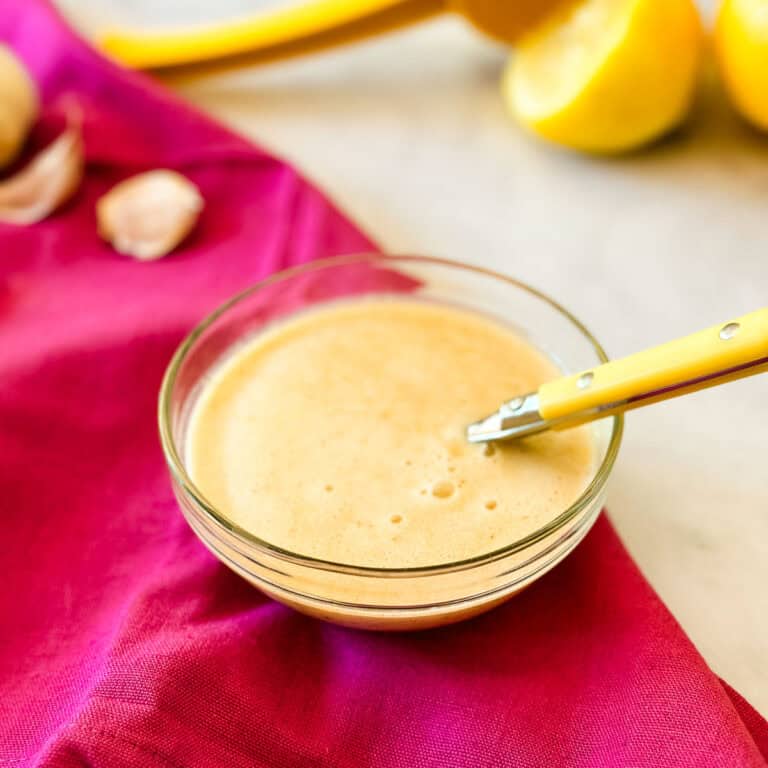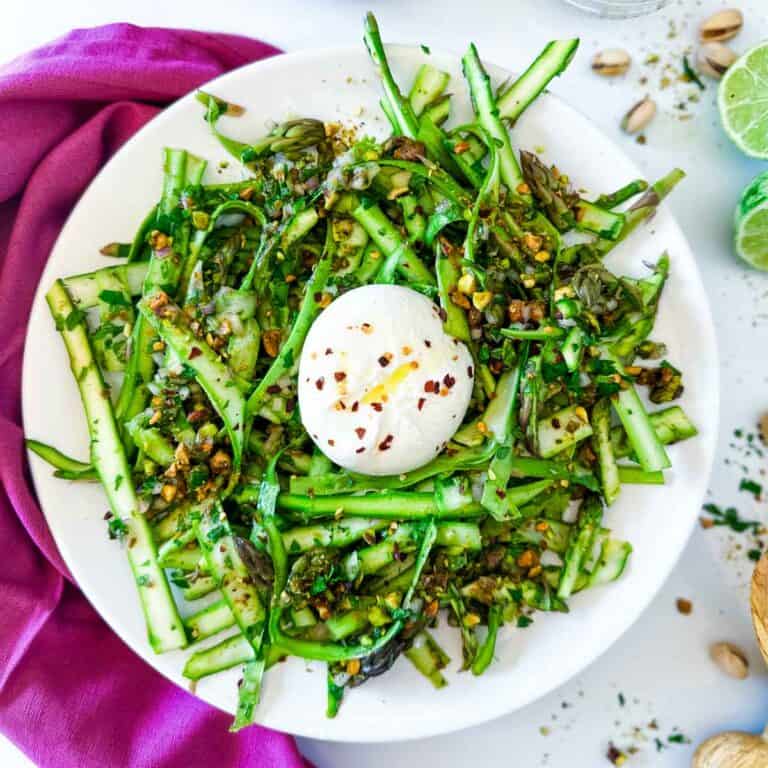Simple Honey Lime Vinaigrette
This Simple Honey Lime Vinaigrette is bold, light and refreshing. Perfect on salads, used as a marinade, or drizzled onto a finished dish, this vinaigrette is so versatile and ready in just 5 minutes!

Vinaigrettes are so easy to take for granted. We think of them largely as salad dressing, and opt for the store bought version out of convenience. But it’s so easy and quick to make your own. The flavors will be fresher and brighter and tailored exactly to your taste!
What’s more? It’s less expensive than store bought AND there’s no chemical preservatives and other weird ingredients that you can’t pronounce and know are not good for you.
My favorite way to use this vinaigrette is on this Shaved Asparagus Salad.
What you’ll love about this vinaigrette:
Recipe ingredients
You’ll need the following ingredients to make this Honey Lime Vinaigrette:

Vinaigrette Ratios
In classic French technique, a standard ratio of fat to acid is typically 3:1. That is to say, for example, for every tablespoon of acid (vinegar, citrus juice), you would add 3 tablespoons of fat (olive oil, avocado oil, etc.). To me, this provides a more muted flavor.
I personally prefer a ratio closer to 2:1. But the great part of making your own vinaigrettes is that you can tailor them to your taste.
Some salads are filled with delicate greens and vegetables where a more muted vinaigrette works better and is not over powering. Whereas others contain more hearty greens and vegetables that can stand up to a stronger, more acid-forward vinaigrette.
Flavor Balancing
Flavor balancing should happen in the context of 2 things: ratios and your taste.
RATIOS
The beauty of working with ratios is that you don’t actually have to measure anything – you can eyeball everything.
Why is this important? Well, besides ease and a few less dirty dishes which is nice, it’s important because when you are using citrus for your acid, there’s no guarantee how much juice you are going to get out of a given piece of citrus.
This means that if a recipe calls for the juice of 2 limes, like this recipe, and your limes don’t yield much juice, then you have a choice to rebalance: (1) you can grab another lime or two or (2) you can adjust the amount of your oil downward.
YOUR TASTE
Equally important is your taste in the flavor balancing equation. The basic ratios kind of give us a lane to operate in, but the reality is that we all have different taste and experience flavors differently.
And this is where the beauty of a homemade vinaigrette comes in – you get to tailor it exactly to your taste. No store bought vinaigrette is going to provide that!
This, of course, requires you to taste as you go through the process. For example, still a little too tart? Add a little more honey or sugar (not necessarily to taste sweet, but rather to take the edge off the acidity). A little too sweet? Add some more acid. Flavors too muted? You might need more salt and/or more acid to balance your amount of oil.
You Only Need a Few Tools
Ways to Blend
There are a few ways to blend a vinaigrette, and they often depend on the ingredients.
WHISK
The classic way to mix a vinaigrette is simply in a bowl with a whisk. I personally think it gives you the best visual of how things are being incorporated, and I find it easiest to add additional ingredients when balancing my flavors.
SHAKE
Many like the ease of using a jar with a lid to shake a vinaigrette, as it’s easy to see your ratio acid and fat on the side of the jar. Although I do sometimes use a jar, I do find it a pain to keep opening and closing the jar to add flavor adjusting ingredients.
BLEND
Blending a vinaigrette can be done with an immersion blender, a regular blender or a food processor. Using an immersion blender is particularly convenient, as it is small and easy to clean.
However, I never blend a vinaigrette that contains shallots or onions. Blending shallots or onions damages the cell walls to a point where enzymes within the onion kick off a chemical reaction that causes them to release a sulfur-containing molecule which converts to harsh tasting molecules which directly affect the resulting flavor of your vinaigrette.
Let’s Make Honey Lime Vinaigrette together: STEP BY STEP
Be sure to check out the full recipe and ingredient list in the recipe card below

DID YOU KNOW? ALWAYS add the salt to the acid and whisk until dissolved BEFORE adding the oil. Salt has a much more difficult time dissolving once the oil has been added.
Four Ways to Juice a Lime
Storage
You can store this vinaigrette in a jar or other air tight container in the refrigerator for up to 2 weeks.
Variations
Add heat: You can add red chile flakes or finely chopped jalapeno or serano peppers to add some spice to the vinaigrette.
Add umami: You could add a little soy sauce for a tough of umami and depth – just be aware of how much salt you use to season your vinaigrette, as the soy sauce is salty by nature.
Add fresh herbs: Fresh mint or basil, in particular, would be lovely additions. If you are making the vinaigrette ahead of time, then just add the chopped herbs right before serving.
Add cheese: A salty crumbly cheese like feta would be a nice addition, depending on the use for your vinaigrette.

FAQs
I hope you love this Honey Lime Vinaigrette! If you make it, be sure to leave a rating so I know how you liked it!

Honey Lime Vinaigrette
Ingredients
- 2 limes (zest and juice)
- 1/2 tsp kosher salt
- 1/2 tsp black pepper
- 1 shallot (finely chopped)
- 1 tsp honey
- 1/4 cup olive oil
Instructions
- Add the lime juice, lime zest, salt and pepper to a medium bowl and whisk until the salt has dissolved.
- Next, add the shallot and honey and whisk until combined.
- While continuously whisking, slowly add the olive oil until completely incorporated. Taste and adjust any of the flavors to suit your taste.
Video
Notes
- PLEASE NOTE: Different limes will yield different amounts of juice. Therefore, follow your preferred ratios and adjust accordingly – 3 parts oil to one part lime juice for a milder end result or 2 parts oil to one part lime juice. In the event that you have extra juicy limes and your vinaigrette is too tart, you may need to add more honey to achieve balance and suit your taste.
Did you make this recipe? I want to know!
I’d love to hear from you! Consider leaving a comment and rating below.
My readers love to read your reviews, adaptations and suggestions! Have a question? I’ll personally respond within 24 hours. Please share any photos on instagram and tag me @nataliemarblecooks so I can see your creations!






